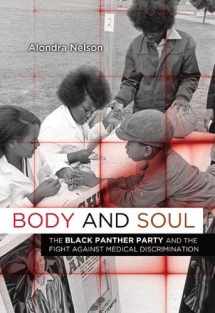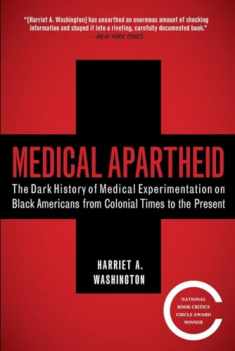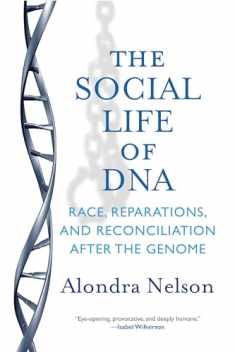
Body and Soul: The Black Panther Party and the Fight against Medical Discrimination
ISBN-13:
9780816676491
ISBN-10:
0816676496
Edition:
Reprint
Author:
Alondra Nelson
Publication date:
2013
Publisher:
Univ Of Minnesota Press
Format:
Paperback
312 pages
FREE US shipping
on ALL non-marketplace orders
Marketplace
from $16.68
USD
Marketplace offers
Seller
Condition
Note
Seller
Condition
New
Brand New! Not overstocks! Brand New direct from the publisher! Ships in sturdy cardboard packaging.
Book details
ISBN-13:
9780816676491
ISBN-10:
0816676496
Edition:
Reprint
Author:
Alondra Nelson
Publication date:
2013
Publisher:
Univ Of Minnesota Press
Format:
Paperback
312 pages
Summary
Body and Soul: The Black Panther Party and the Fight against Medical Discrimination (ISBN-13: 9780816676491 and ISBN-10: 0816676496), written by authors
Alondra Nelson, was published by Univ Of Minnesota Press in 2013.
With an overall rating of 4.1 stars, it's a notable title among other
United States History
(Health Care Delivery, Administration & Medicine Economics, Medicine, Sociology, Americas History) books. You can easily purchase or rent Body and Soul: The Black Panther Party and the Fight against Medical Discrimination (Paperback) from BooksRun,
along with many other new and used
United States History
books
and textbooks.
And, if you're looking to sell your copy, our current buyback offer is $2.22.
Description
2013 MIRRA KOMAROVSKY AWARD
2012 LETITIA WOODS BROWN MEMORIAL AWARD
2012 ASSOCIATION FOR HUMANIST SOCIOLOGY AWARD
2012 DISTINGUISHED CONTRIBUTION TO SCHOLARSHIP AWARD, ASA
2012 C. WRIGHT MILLS AWARD (FINALIST)
Between its founding in 1966 and its formal end in 1980, the Black Panther Party blazed a distinctive trail in American political culture. The Black Panthers are most often remembered for their revolutionary rhetoric and militant action. Here Alondra Nelson deftly recovers an indispensable but lesser-known aspect of the organization's broader struggle for social justice: health care. The Black Panther Party's health activism--its network of free health clinics, its campaign to raise awareness about genetic disease, and its challenges to medical discrimination--was an expression of its founding political philosophy and also a recognition that poor blacks were both underserved by mainstream medicine and overexposed to its harms.
Drawing on extensive historical research as well as interviews with former members of the Black Panther Party, Nelson argues that the Party's focus on health care was both practical and ideological. Building on a long tradition of medical self-sufficiency among African Americans, the Panthers' People's Free Medical Clinics administered basic preventive care, tested for lead poisoning and hypertension, and helped with housing, employment, and social services. In 1971, the party launched a campaign to address sickle-cell anemia. In addition to establishing screening programs and educational outreach efforts, it exposed the racial biases of the medical system that had largely ignored sickle-cell anemia, a disease that predominantly affected people of African descent.
The Black Panther Party's understanding of health as a basic human right and its engagement with the social implications of genetics anticipated current debates about the politics of health and race. That legacy--and that struggle--continues today in the commitment of health activists and the fight for universal health care.
2012 LETITIA WOODS BROWN MEMORIAL AWARD
2012 ASSOCIATION FOR HUMANIST SOCIOLOGY AWARD
2012 DISTINGUISHED CONTRIBUTION TO SCHOLARSHIP AWARD, ASA
2012 C. WRIGHT MILLS AWARD (FINALIST)
Between its founding in 1966 and its formal end in 1980, the Black Panther Party blazed a distinctive trail in American political culture. The Black Panthers are most often remembered for their revolutionary rhetoric and militant action. Here Alondra Nelson deftly recovers an indispensable but lesser-known aspect of the organization's broader struggle for social justice: health care. The Black Panther Party's health activism--its network of free health clinics, its campaign to raise awareness about genetic disease, and its challenges to medical discrimination--was an expression of its founding political philosophy and also a recognition that poor blacks were both underserved by mainstream medicine and overexposed to its harms.
Drawing on extensive historical research as well as interviews with former members of the Black Panther Party, Nelson argues that the Party's focus on health care was both practical and ideological. Building on a long tradition of medical self-sufficiency among African Americans, the Panthers' People's Free Medical Clinics administered basic preventive care, tested for lead poisoning and hypertension, and helped with housing, employment, and social services. In 1971, the party launched a campaign to address sickle-cell anemia. In addition to establishing screening programs and educational outreach efforts, it exposed the racial biases of the medical system that had largely ignored sickle-cell anemia, a disease that predominantly affected people of African descent.
The Black Panther Party's understanding of health as a basic human right and its engagement with the social implications of genetics anticipated current debates about the politics of health and race. That legacy--and that struggle--continues today in the commitment of health activists and the fight for universal health care.


We would LOVE it if you could help us and other readers by reviewing the book
Book review

Congratulations! We have received your book review.
{user}
{createdAt}
by {truncated_author}




